Interviews are not one-sided evaluations, or at least they shouldn’t be.
They should be a two-way conversation where you, as a candidate, should figure out if you’ll be spending the next few years of your life with a company.
While you’re busy impressing them with your qualifications, it’s just as important to make sure they’re impressing you, too.
After all, you want a role that aligns with your goals and, let’s be honest, your sanity, besides a paycheck.
The best way to make sure you’re not getting yourself into a situation you’ll regret later is by asking the right questions.
In this article, we round up the best questions to ask recruiters that’ll help you figure out the interview process with a little less anxiety.
Why Asking Recruiters Questions Is Important
When you’re job hunting and finally land a conversation with a recruiter, it is very common to feel like the ball is in their court.
Many of us just focus on impressing the interviewers and interrogating them isn’t even in our thoughts.
But the problem is that when you don’t ask questions, the chances of you ending up miserable six weeks in and wondering what went wrong are quite high.


Never Worry About AI Detecting Your Texts Again. Undetectable AI Can Help You:
- Make your AI assisted writing appear human-like.
- Bypass all major AI detection tools with just one click.
- Use AI safely and confidently in school and work.
Recruiters speak to a lot of candidates. Ask thoughtful questions to signal them that you have options, and you’re evaluating them.
It changes the dynamic from “please hire me” to “let’s see if we’re a fit.”
Indeed highlights that asking insightful questions during interviews can help you identify any potential red flags and ensure the role truly aligns with your career goals.
Plus, many job postings are too polished and sometimes even completely off-base.
Asking questions peels back that surface gloss and helps you understand the actual job or catch any red flags before you walk into a toxic environment.
How the Right Questions Can Help You Find the Best Job
Landing a job and landing the right job are two very different things.
Asking intentional questions helps you figure out, “Is this job going to grow me or grind me down?”
Every job sounds good in the job description. But only your questions can reveal what it actually feels like to live it.
Also, your manager can make or break your job satisfaction.
But no recruiter will outright say, “Oh, the manager is kind of a micromanager and struggles with communication.”
Instead, asking, “How does the manager support their team? Can you share a recent challenge they helped with?” can give you some insight into their management style.
A common reason why people leave jobs quickly is misaligned expectations.
You think you’re walking into a creative, high-impact role, but it turns out it’s mostly spreadsheet babysitting.
You must ask questions about your expectations from the job. Not just vaguely about goals, but specific deliverables, timelines, cultural expectations, etc.
Forbes provides a great list of additional insightful questions to ask recruiters that can help you get a clearer picture of what a role really entails
Best Questions to Ask Recruiters Before Applying for a Job
Saving your questions for the interview stage is a big mistake.
By then, you’ve already invested your time and effort and maybe even gone through a screening round, only to find out the salary is 40% below your expected range.
The problem is, most of us don’t know what to ask, or we default to generic, safe questions that get us zero useful info.
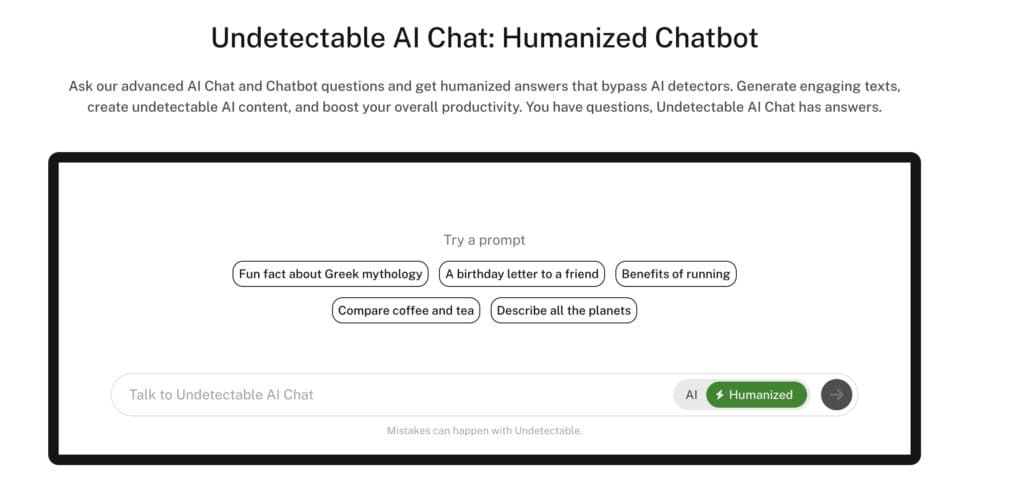
To get context-specific questions for a job, try using Undetectable AI chat. You can feed it the following prompt:
“Analyze this job description and help me come up with specific, insightful questions I should ask the recruiter before applying. Focus on work expectations, team structure, career growth, and red flags.”
Here are some good questions to ask recruiters that point you directly to the best opportunities.
- What are the top 3 priorities for someone in this role during the first 90 days?
This question shows you’re already thinking about how you can contribute from day one.
You can also use this answer to figure out whether the role has a structured onboarding process or if you’re expected to figure things out on your own.
- Can you describe the working style of the hiring manager and what they value most in team members?
Your relationship with your manager can make or break your experience at any job.
It reveals insight into their working style, whether they are hands-on or hands-off, if they value independence or collaboration, what personal traits they’re looking for in a team member, all of which directly impacts your day-to-day work life.
- Where does this role sit in the team structure, and how does it interact with other departments?
Understanding how this role fits into the larger team structure helps you see its level of impact.
If the role works cross-functionally with other departments, that’s a sign it’s integral to the business.
If it’s isolated, you’ll want to know if that’s a dealbreaker for your work preferences.
- What does progression look like from this role in the next 1–2 years? Is there a precedent for internal promotions?
This question demonstrates that you’re thinking long-term, not just looking for a job to fill a gap.
It gives you a clear view of whether there’s room to grow in the company and what paths might open up for you down the line.
- What does a typical week look like in terms of workload and hours during busy vs. normal periods?
No one wants to be blindsided by an overwhelming workload or unpredictable hours.
The recruiter’s answer to this question will help you understand the work environment and what you’re walking into on a weekly basis.
- Are there specific tools, systems, or frameworks that the team is currently transitioning to or heavily relies on?
Now, this one helps you assess whether you need to upskill or if you already have the expertise needed to hit the ground running.
It reveals the technology or systems you’ll be working with and how forward-thinking the team/company is with technology.
- Is this a new role or a backfill? If it’s a backfill, what led the last person to move on?
Asking if it’s a new role or a backfill tells you the stability of the role, the company’s ability to retain talent, or the reasons for turnover.
If they tell you the backfill is because the previous candidate was promoted to a higher role, it’s a green flag for you.
You can also check out Coursera’s list of 10 essential questions to ask recruiters, which can help you prepare thoughtful questions before applying for a job.
Best Questions to Ask Recruiters After an Interview
After you’re done with your interview, you must either be riding a wave of “That went great!” or replaying every answer, wondering if you should’ve said “collaborative” instead of “independent.”
Either way, it’s natural for every candidate’s post-interview instinct to sit back and wait. But don’t.
The post-interview window is actually one of your most powerful leverage points.
Ask your recruiter the right questions after the interview so they keep you top of mind.
We’re done with “When can I expect to hear back?” Here are some value-packed questions to ask recruiters during interview or right after it.
- Is there anything about my interview that gave the team pause or that I could clarify further?
Most candidates never ask this, but it signals that you’re self-aware and proactive.
And occasionally, the recruiter may reveal a concern that you can immediately address in your follow-up email.
- What are the next steps in the process, and is there anything I can do to strengthen my application in the meantime?
Yes, it’s partially about timing, but it is also your attempt to mention that you’re still in the game and you’re looking to win.
- How does the team make their final decision—what are the key factors they’ll be weighing?
Now you will get insight into how decisions are made, e.g., skills vs. culture fit, experience vs. potential.
It also shows you’re thinking like someone who wants to be a smart and strategic hire.
- Is there anything I can prepare ahead of the next round that would be helpful to the team?
If there’s a technical test or portfolio review coming up after your interview, you have a head start.
And if not, you’ve just shown that you’re already thinking ahead and focused on making things easier for the team.
- Would it be helpful if I followed up with anything else to support my candidacy?
Again, this is one of the low-pressure, high-return questions to ask recruiters during the phone screen.
The recruiter may end up saying, “Actually, yes, it would help to have a more recent writing sample.” You never know.
How AI Tools Can Help You in the Recruitment Process
Job hunting feels like a full-time job in itself.
It’s exhausting to tweak your resume for every single job you apply to and draft cover letters that somehow still sound the same.
You’d normally have to sit down, adjust your skills and experience for each job, make changes to your resume and cover letter, and pray they pass through Applicant Tracking Systems (ATS).
Fortunately, Undetectable AI tools can help loads while job hunting.
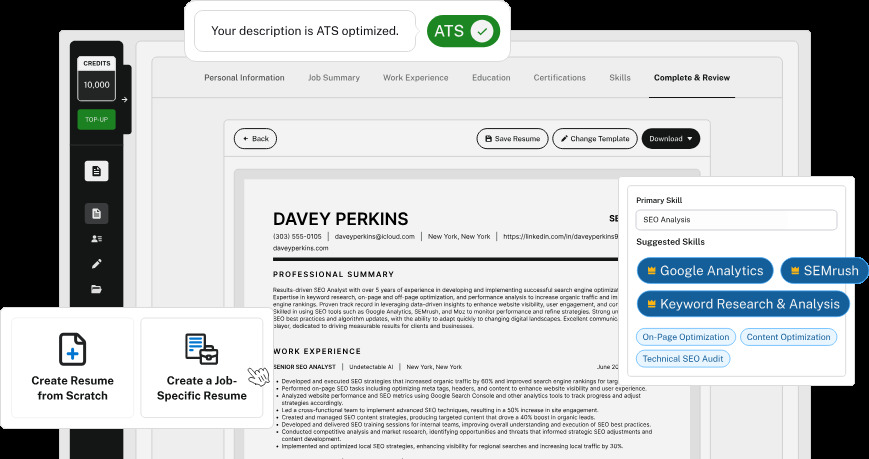
The Resume Builder, for example, only requires you to select a template out of hundreds of designs and upload your details.
Then, AI will optimize it using industry-specific keywords by itself and you will be ready to go, with just a few clicks.
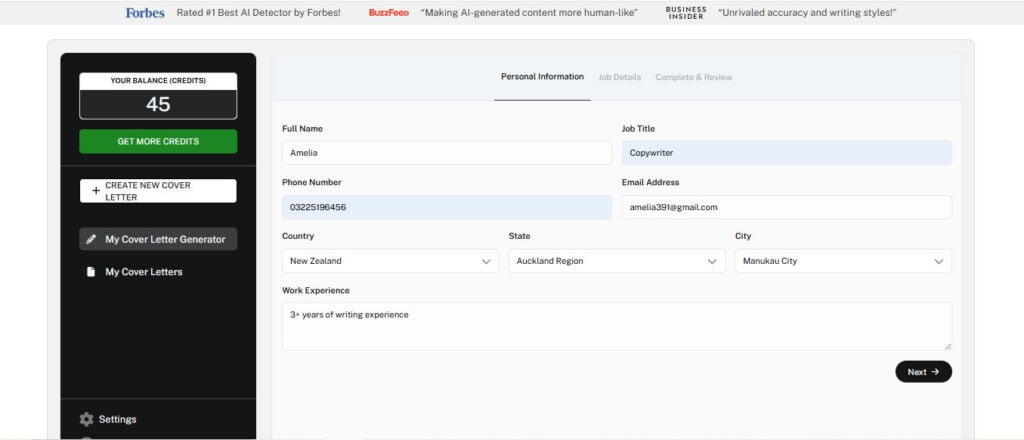
Similarly, the Cover Letter Generator asks you to simply input your details or import your LinkedIn profile, and it’ll generate a customized cover letter aligned with the job you’re applying for.
Imagine how much time that could save you!
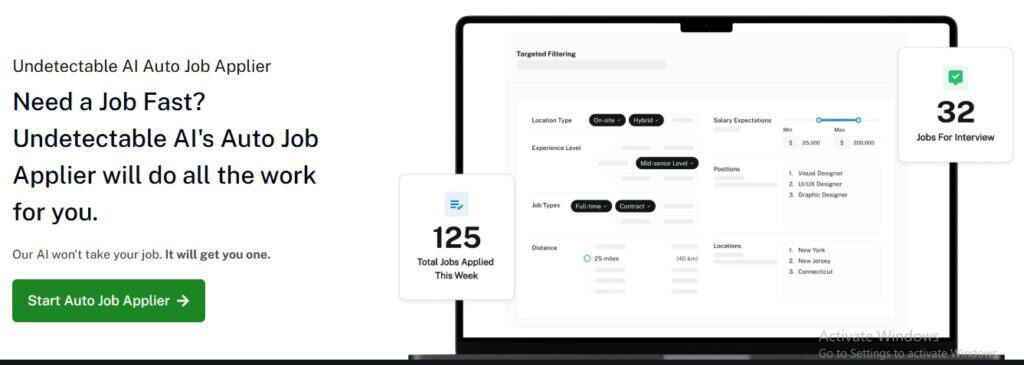
The AI Auto Job Applier takes the tedious part of applying to jobs off your plate.
All you have to do is upload your resume, set your filters, and with a single click, the AI will send your application to all the best-fit jobs while you kick back and relax.
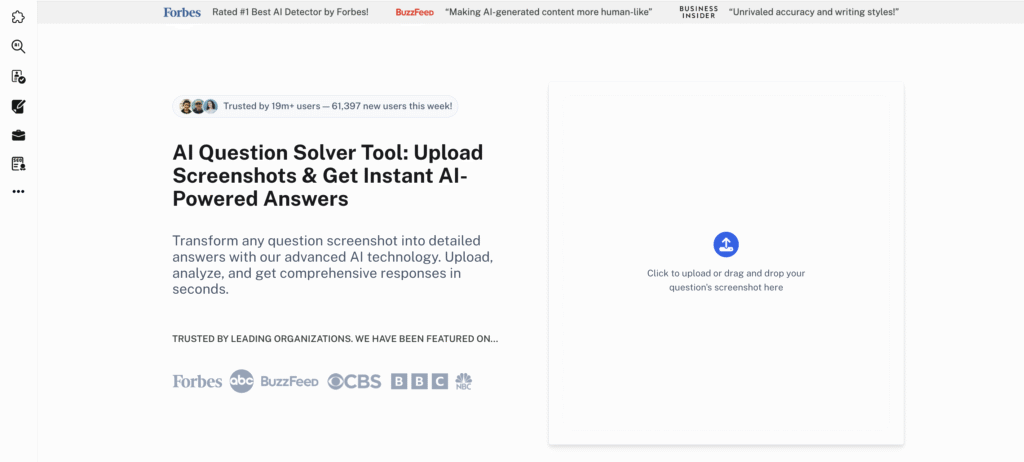
Need help practicing your answers for common or tricky interview questions?
Try AI Question Solver. Just type in a question and it gives you a clear, confident response—perfect for prepping fast and sounding polished.
Curious about our AI Detector and Humanizer? Try them in the widget below!
FAQs About Asking Recruiters Questions
Can I Ask a Recruiter About Salary?
Definitely, you can ask a recruiter about salary, but it’s best that you wait until they’ve shown some interest in moving you forward in the process.
What Should I Avoid Asking Recruiters?
You should avoid asking recruiters questions that can be easily answered through research, like the company’s basic details or job requirements.
Should I Follow Up If a Recruiter Doesn’t Respond?
Yes, it’s appropriate to follow up if a recruiter hasn’t responded after a reasonable amount of time, about one to two weeks.
However, make sure you are not too pushy and don’t bombard the recruiter with follow-up questions every other day.
Conclusion
At the end of the day, the purpose of interviews is to ensure you’re walking into the right role.
The questions to ask recruiters that we listed above will help you clarify details before investing time and energy in applying to jobs and gain deeper insight after the interview.
Now, if you’re looking to improve your job search even further and make your applications stand out, Undetectable AI has your back.
Use it to create your resume tailored for every job you apply to, generate personalized cover letters, and automate your job application process.
Give Undetectable AI a try today!
